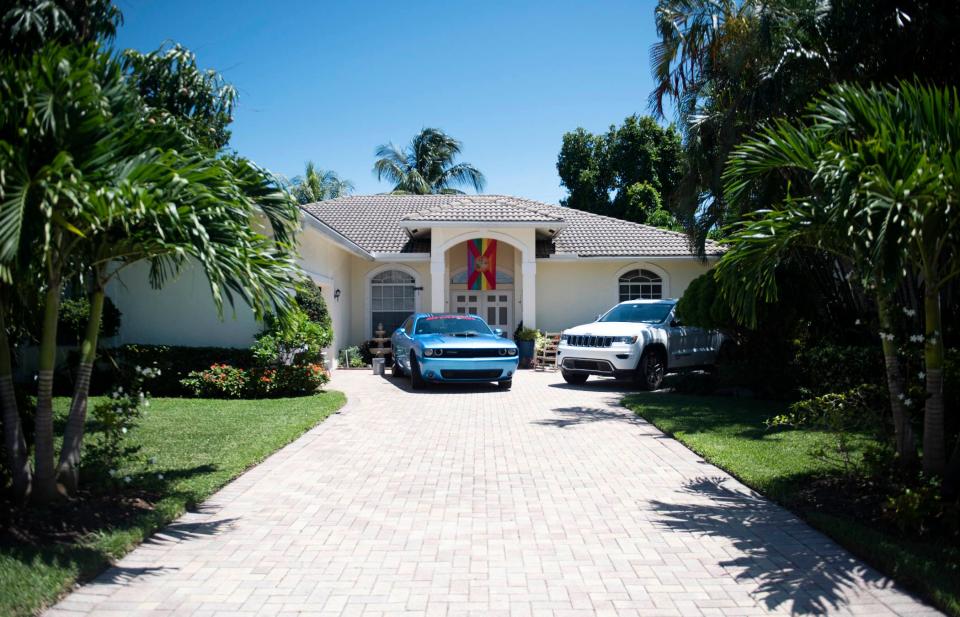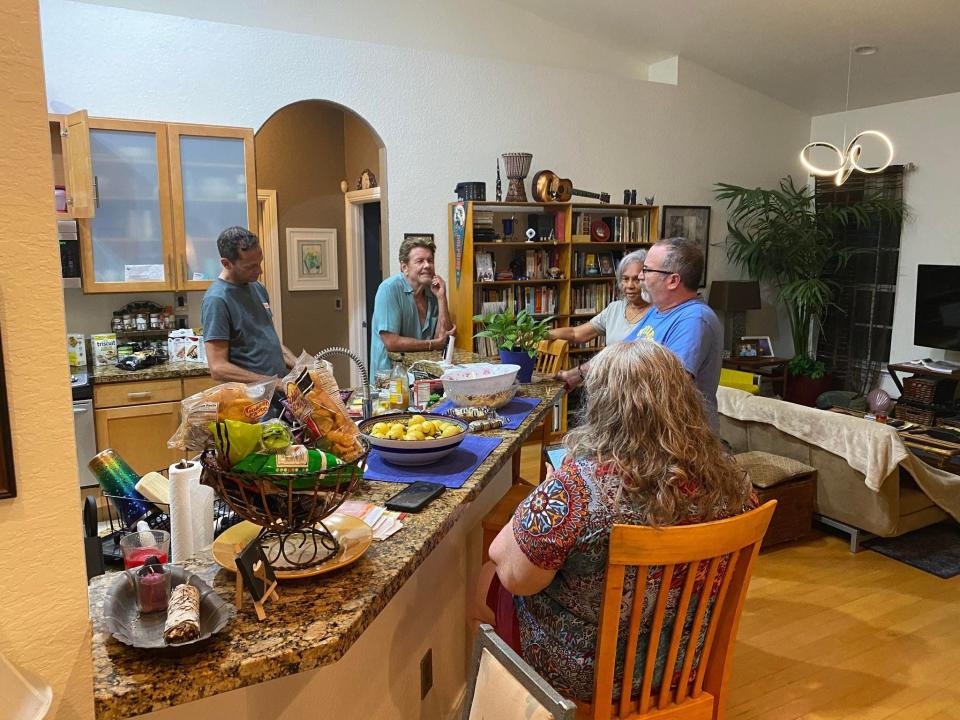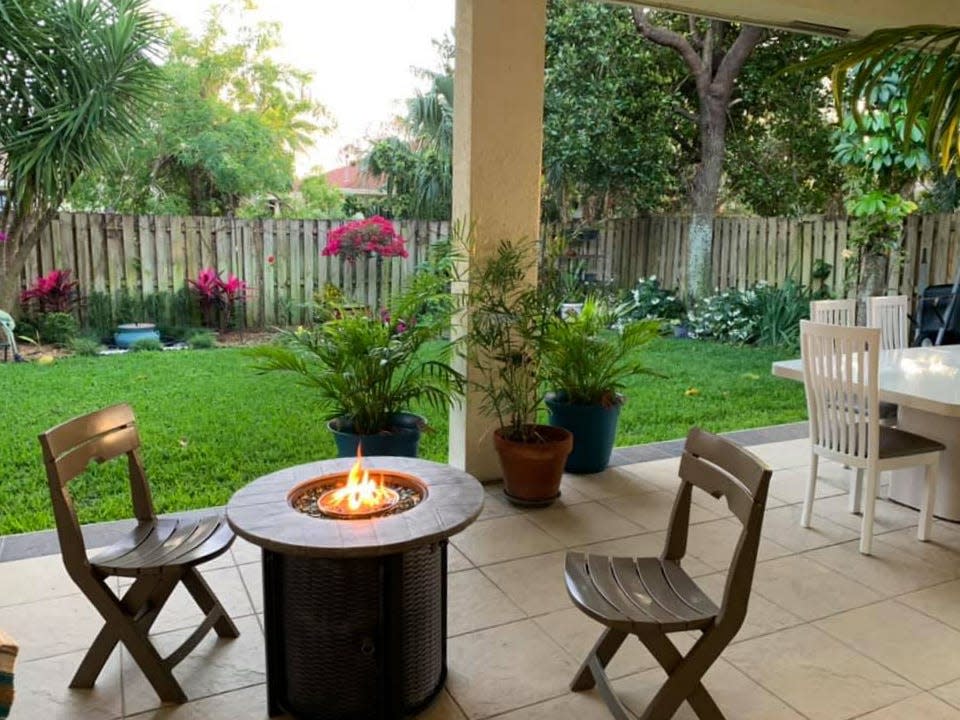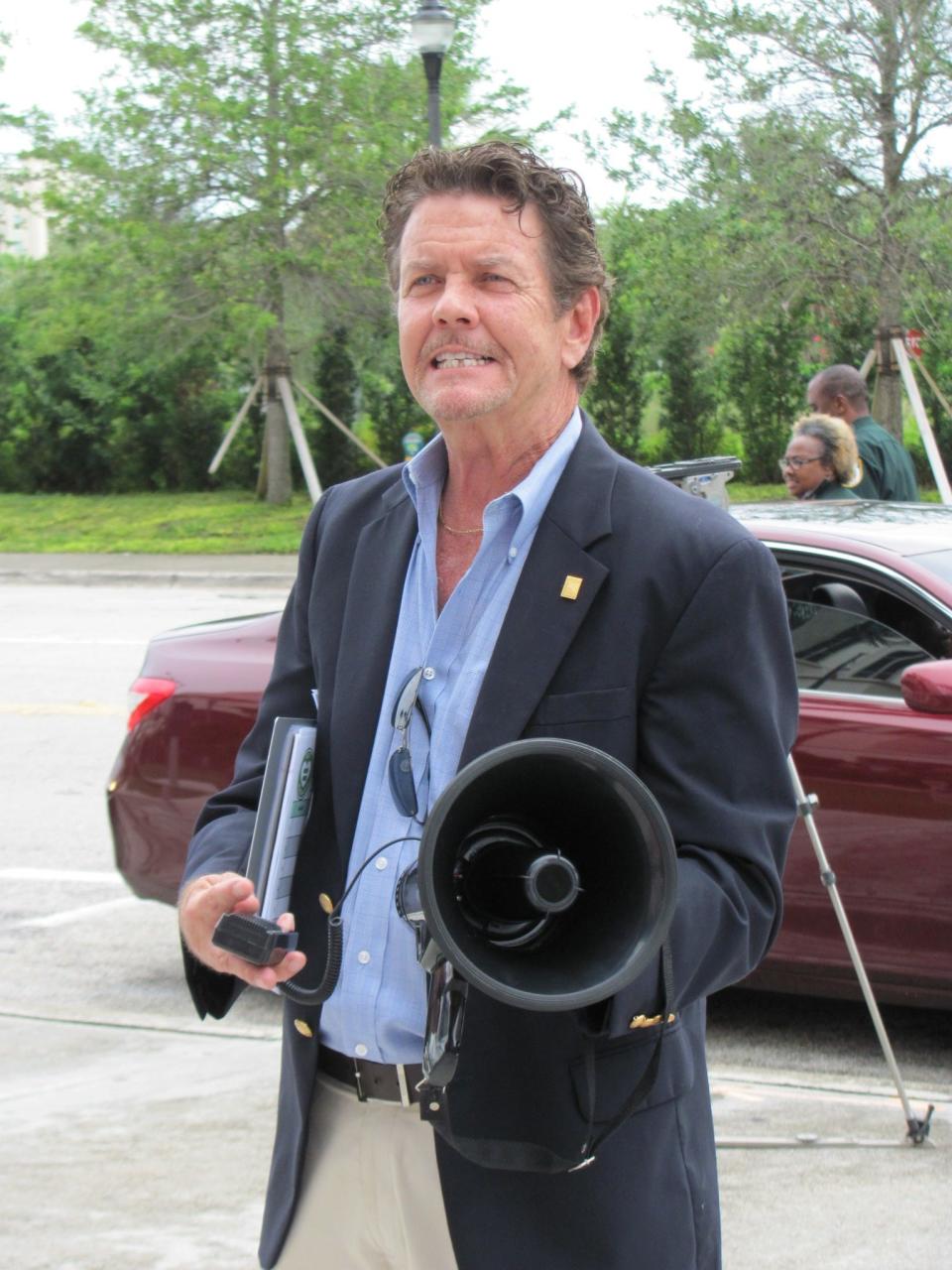LGBTQ+ seniors have faced a lifetime of discrimination; a Boynton assisted living home wants to help
BOYNTON BEACH — America’s LGBTQ+ seniors have faced decades of discrimination in their jobs, schools, churches and gathering places. Now, as they enter their so-called golden years, they still face the possibility of harassment in their own homes.
A handful of studies during the past decade have shown that some long-term care facilities treat people differently if they identify as LGBTQ+. An applicant might face higher fees and a more complicated sign-up process, while existing residents might face hostility from staff and fellow residents.
“The guy down in Room 106 could absolutely torment you, and when you’re 90 years old, that is not the time to be worrying about nonsense like that,” said Allan Hendricks, a longtime gay rights activist.
That’s why Hendricks opened the Connie House, an assisted living facility in Boynton Beach that specializes in serving LGBTQ+ people.

Advocates have long talked about how to protect the growing population of LGBTQ+ seniors in America, and Hendricks — a landscape architect by trade — took a leap of faith and offered his own solution. About three years ago, he purchased the four-bedroom home in a residential Boynton Beach neighborhood and renovated the property inside and out.
The home earned all of its licensing and officially opened in late May, just before Pride Month, and Hendricks is now accepting applications for the first residents. He also recently earned a platinum credential from SAGECare, a training program that ensures providers are welcoming to LGBTQ+ people.

The home, located just down the street from the Boynton Beach Mall, can house up to six residents, along with a rotating group of staff who provide 24/7 care.
Connie House is also offering meals, activities and transportation to local events and resources, including the Compass LGBTQ+ Community Center in Lake Worth Beach.
“It won't be 'Sit here and stare at the TV,'” Hendricks said. “We’re going to encourage exercise. We’re going to encourage mental stimulation."

Where did the Connie House get its name? Boynton Beach assisted living home honors LGBTQ+ activist
Hendricks said some people warned him against opening the assisted living home in Florida.
Equality Florida and the Human Rights Campaign issued a joint travel advisory last month. It warned people about the risks of visiting or moving to the state, where lawmakers considered a historic number of anti-LGBTQ+ bills during the most recent legislative session.
But the need was too great, and LGBTQ+ people have always been fighters, Hendricks said. Authorities criminalized people for being gay, and they pushed back during the Stonewall Uprising in 1969. They launched a pride movement throughout the U.S., advocated for marriage and workplace equality and developed their own support groups.

“We don’t bow to fear,” Hendricks said. “That’s not a thing.”
He said the Connie House is a reflection of that fighting spirit. The home is named after the late Connie Kurtz, a longtime artist and LGBTQ+ activist who, alongside her partner, Ruth Berman, sued the New York City Board of Education for domestic partner benefits in the '90s.
Kurtz passed away at their West Palm Beach home in 2018, and her artwork is now displayed at the assisted living home in Boynton Beach.
Her partner is still a fierce advocate for the community, and just last month, lawmakers announced a bill in the U.S. House — the Ruthie and Connie LGBTQI Elder Americans Act — to honor the couple and address needed care and services for LGBTQ+ seniors.
Studies show discrimination against LGBTQ+ seniors
Without places like the Connie House, some LGBTQ+ seniors are faced with harassment, separated from their partners or forced to hide their identity, effectively forcing them back into “the closet.”
That's according to a 2014 report by the Equal Rights Center. The organization paired two groups of people with “virtually identical profiles” and had them call senior living facilities to ask about housing. The only difference was their sexual orientation.
They made 200 phone calls across nearly a dozen states, including Florida, and the person with a same-sex partner received different treatment 48% of the time, even when they spoke to the same housing agent as the heterosexual caller.
Some homes demanded higher fees from the gay and lesbian callers. In some cases, the staff required a more extensive application and withheld information about available units and sign-up bonuses — info that was provided to the heterosexual testers.
A separate report — co-authored by half a dozen organizations, including Justice in Aging — found that only 22% of LGBTQ+ seniors felt they could be open with the staff at long-term care facilities.
Those seniors, along with their friends, family and service providers, answered the survey in droves. Hundreds of people said LGBTQ+ residents were denied basic services, limited to certain visitors and harassed by staff and other residents.
“Several respondents also reported being ‘prayed over’ or being told that they would ‘go to hell’ for their sexual orientation or gender identity,” according to the report, which was last updated in 2015.
Here’s how to find supportive housing for LGBTQ+ adults
The good news, Hendricks said, is that some providers are moving toward a more inclusive business model. And the timing is no coincidence. The number of LGBTQ+ adults over the age of 50 is likely to hit 7 million by 2030, according to an estimate by SAGE, an organization dedicated to helping those seniors.
“Not only is it the right thing to do, but it’s also financially a good idea for them,” Hendricks said of the newly inclusive care facilities. “We’re making progress on making places more gay friendly, if you will, and some are doing a great job.”
SAGE, working with the Human Rights Campaign, issued guidance on how to find those friendly care facilities. The first step is to ask these questions:
Does the community work with any LGBTQ+ organizations or take part in local LGBTQ+ events?
Are LGBTQ+ people represented in pictures or stories on their website, brochures or marketing materials?
Are the community’s programs and activities split by gender? If so, can residents participate in a way that aligns with their gender identity? The same question applies to the facility’s bathrooms.
Are staff given training on LGBTQ+ older adults?
Do any of the community’s documents include gender-neutral language such as “spouse” or “partner”? And do intake or registration forms ask for pronouns, gender identity, sexual orientation or preferred name?
SAGE and the Human Rights Campaign also review the level of inclusion at senior housing and long-term care communities that voluntarily take part in an annual survey. A total of 200 communities in 34 states took part in this year's report.
Here are some of the standards that LGBTQ+ seniors can expect to find in a friendly community:
A non-discrimination policy that makes reference to sexual orientation and gender identity. Such policies can sometimes be found on the community’s website or in its marketing materials. Otherwise, ask for a copy.
An equal visitation policy, meaning a resident’s right to see any visitor of their choosing, at any time and with privacy.
A rooming policy that's LGBTQ+ inclusive, meaning residents can live with their same-sex partner, and that residents will be placed in a room based on their gender identity.
To find a SAGECare certified provider, visit their website at sageusa.care/sagecare-providers. And to learn more about the Connie House in Boynton Beach, visit thepridetribe.org/the-connie-house.
Giuseppe Sabella is a reporter covering Boynton Beach and Lake Worth Beach at The Palm Beach Post, part of the USA TODAY Florida Network. You can reach him at gsabella@pbpost.com. Help support our journalism and subscribe today.
This article originally appeared on Palm Beach Post: Connie House offers LGBTQ+ friendly assisted living in Boynton Beach

